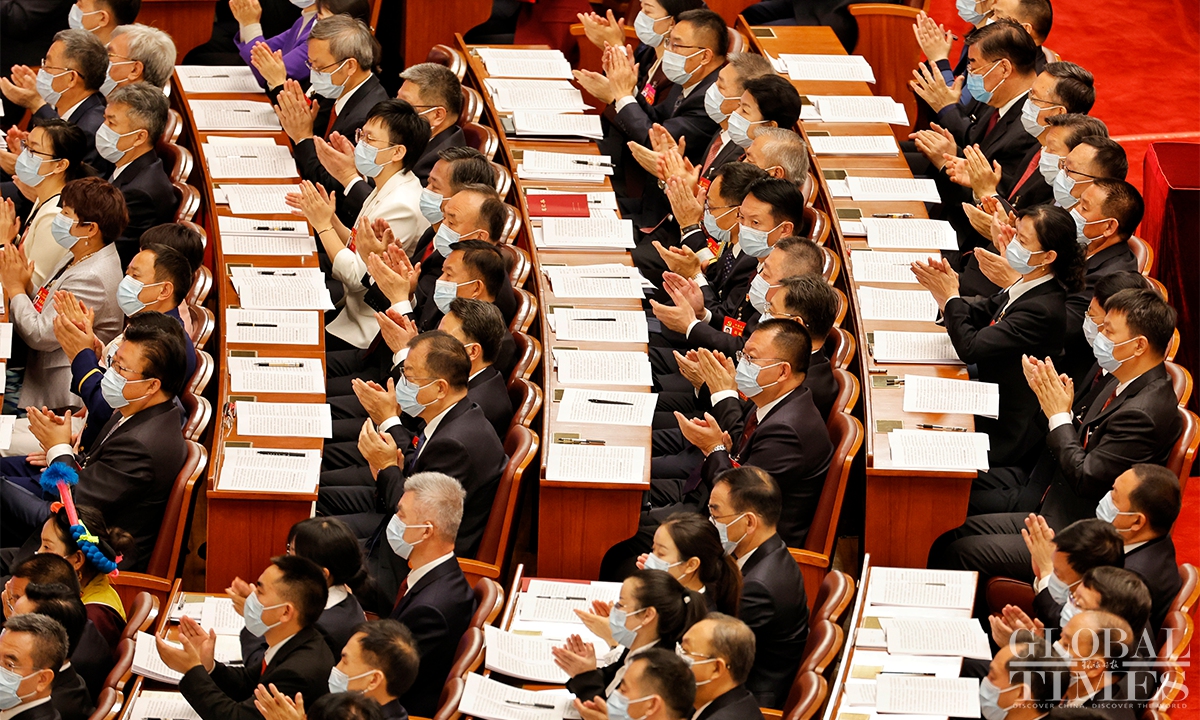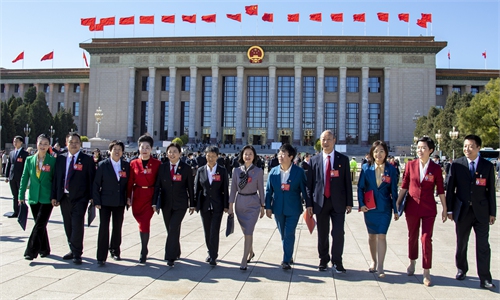
The 20th National Congress of the Communist Party of China (CPC) opens at the Great Hall of the People in Beijing on October 16, 2022. Photo: Li Hao/GT
The just-concluded 20th National Congress of the Communist Party of China (CPC) elaborated on Chinese modernization, which offers a path for other countries to seek inspiration, senior Party officials at a Monday press conference reiterated that China will not export its model to other countries, nor will it import models from other countries; every country should explore its own way to modernization that suits its own situation, in response to questions and concerns from the West about whether "China might export its ideology or development model."
Sun Yeli, deputy head of the Publicity Department of the CPC Central Committee and spokesperson for the 20th CPC National Congress, made the remarks Monday after the week-long 20th National Congress of the CPC concluded on Saturday in Beijing.
The press conference was also joined by senior Party officials of the CPC Central Committee from departments and commissions including the Policy Research Office, the Central Commission for Comprehensively Deepening Reform, the Commission for Political and Legal Affairs, the Central Commission for Discipline Inspection, and the General Office, as they introduced the report from different aspects that related to their work, such as economic development, the anti-corruption campaign and law-based governance.
Chinese observers said Western modernization, which is driven by capitalists, is increasingly showing its problems and weakness amid profound changes that the world has not seen in a century, as domestically, uneven development and unfair distribution of wealth in the West are causing serious problems such as populism and polarization, and internationally, some Western modernized major powers are undermining globalization through protectionism and unilateralism, seeking "decoupling" with other non-Western major powers, and even inciting regional conflicts to push bloc-to-bloc confrontation.
Amid this concerning situation and dangerous trend, the world needs an alternative for realizing modernization, and China is offering it to the world, and it's total nonsense to misinterpret China's intention as "exporting its development model," observers said.
China will never act like some Western countries by forcing others to accept its ideology as "the only correct answer," and if the West finds the concept of "Chinese modernization" uncomfortable and offensive, it means the West is getting less and less confident, said experts.
Alternative way to modernization
When asked whether "Chinese modernization offers a new choice for achieving modernization", a phrase used in the report to the 20th CPC National Congress, means China intends to export its development model to other countries, Sun said that although modernization is a common pursuit for people from all those countries, there is no unified model to achieve such a goal.
Chinese modernization shares similarities with other countries' path to modernization, and it has its own characteristics, said Sun, noting that China's huge population means the country cannot simply copy other countries' models.
Sun emphasized that Chinese modernization is aimed to allowing all Chinese people to live good lives and realize common prosperity, and will not leave certain groups behind.
Sun also noted that Chinese modernization is a combination of both material and spiritual civilization; a harmonious co-existence between humanity and nature. "Chinese modernization is a modernization of peaceful development. We did not walk down the old path of war, colonization and pillaging, but through peace, development and win-win cooperation," said Sun, noting that China hopes every country can pursue the peaceful development model.
Yang Xuedong, a professor of political science at Tsinghua University, told the Global Times on Monday that the emergence of the concept of "Chinese modernization" reflects the fact that there are multiple paths to modernization and not just one - the Western one — and it's necessary for all countries in the world to learn from each other's experience as "they share more and more common problems and challenges which require not only cooperation but also mutual learning."
Zheng Yongnian, a professor at the Chinese University of Hong Kong, Shenzhen and president of the Institute for International Affairs, Qianhai, said to media on Monday that "the Western or US path to modernization is dominated by capitalism," while Chinese modernization is based on the socialist political system.
US and Western modernization used to be very advanced, and have very developed economies, and science and technologies, "but why do they look very problematic at the moment? The answer is in their political system."
Western modernization indulged in the disorderly expansion of capital, resulting in a divided society where the wealth gap became wider and wider, and the majority of ordinary people failed to share in the benefits of development and Western-dominated globalization. This has now resulted in populism and polarization, with endless and intensifying struggles between different groups in their societies, such as left and right, conservatives and liberals, black and white communities, men and women, as well as LGBT and anti-LGBT groups, said analysts.
Unfortunately, such endless struggles have not helped the West to reform their modernization and political system or to effectively solve some of the internal problems and make their people more united, but have just further torn society apart and left the problems unsolved and even made them worse, which has made more and more non-Western developing countries lose faith in Western modernization and no longer believe in the fairy tale of "Western democracy," experts noted.
This is why the West is being so hostile and suspicious toward Chinese modernization, as Western elites who used to be arrogant are now becoming less and less confident, analysts said.
China's vitality comes from the sustainable development of its economy, and its development will not end up enriching just a small group of people as has happened in the capitalist West, but will make efforts to achieve common prosperity for everyone, Zheng noted.
For the international community, the value of Chinese modernization lies in the fact that "China pursues not only its own modernization, but modernization for all countries and human beings," which means the process with which it pursues modernization is perpetual and dynamic, Zheng said.
Common prosperity
The Chinese modernization that seeks equality and modernization for everyone will unavoidably affect the hegemonic power, which aims to dominate the world order, so it will impose pressure and hostility on China, and how the CPC decides on its future economic policy to govern China under pressure from the US is a key question, experts noted.
At the press conference on Monday, one foreign journalist asked that with the US escalating trade and technology control measures that could suppress China's development, will China prioritize "making a bigger cake, or sharing the cake fairly?"
Jiang Jinquan, director of the Policy Research Office of the CPC Central Committee, responded by saying that common prosperity is an "essential requirement of socialism" and a "key feature of Chinese-style modernization."
It reflects the CPC's commitment to a people-centered development philosophy, Jiang said. Only socialism has the conditions and ability to achieve common prosperity for all, while capitalism seeks maximum interests for capital and therefore cannot attain real common prosperity, Jiang said.
To realize common prosperity, the nation should first "make a bigger cake" through the joint efforts of the people, and then divide and distribute the cake properly through rational institutional arrangements and avoid polarization, according to Jiang.
Facing the US' increasing suppression, China must continue to boost the vitality of the market and society, which are the most fundamental factors in economic development. "Based on a vital market, China should then make full use of its institutional advantages, for example concentrate resources to solve certain stranglehold problems," Yang said.
Achieving common prosperity is a long-term goal, and in order to realize it, "we can neither wait around nor be too hasty," Jiang noted. "We should work on the reality that China is still a developing country, continue to develop productive forces by complying with China's basic conditions and principles, and should create and accumulate social wealth continuously in order to steadily enhance people's living standards," he remarked.


